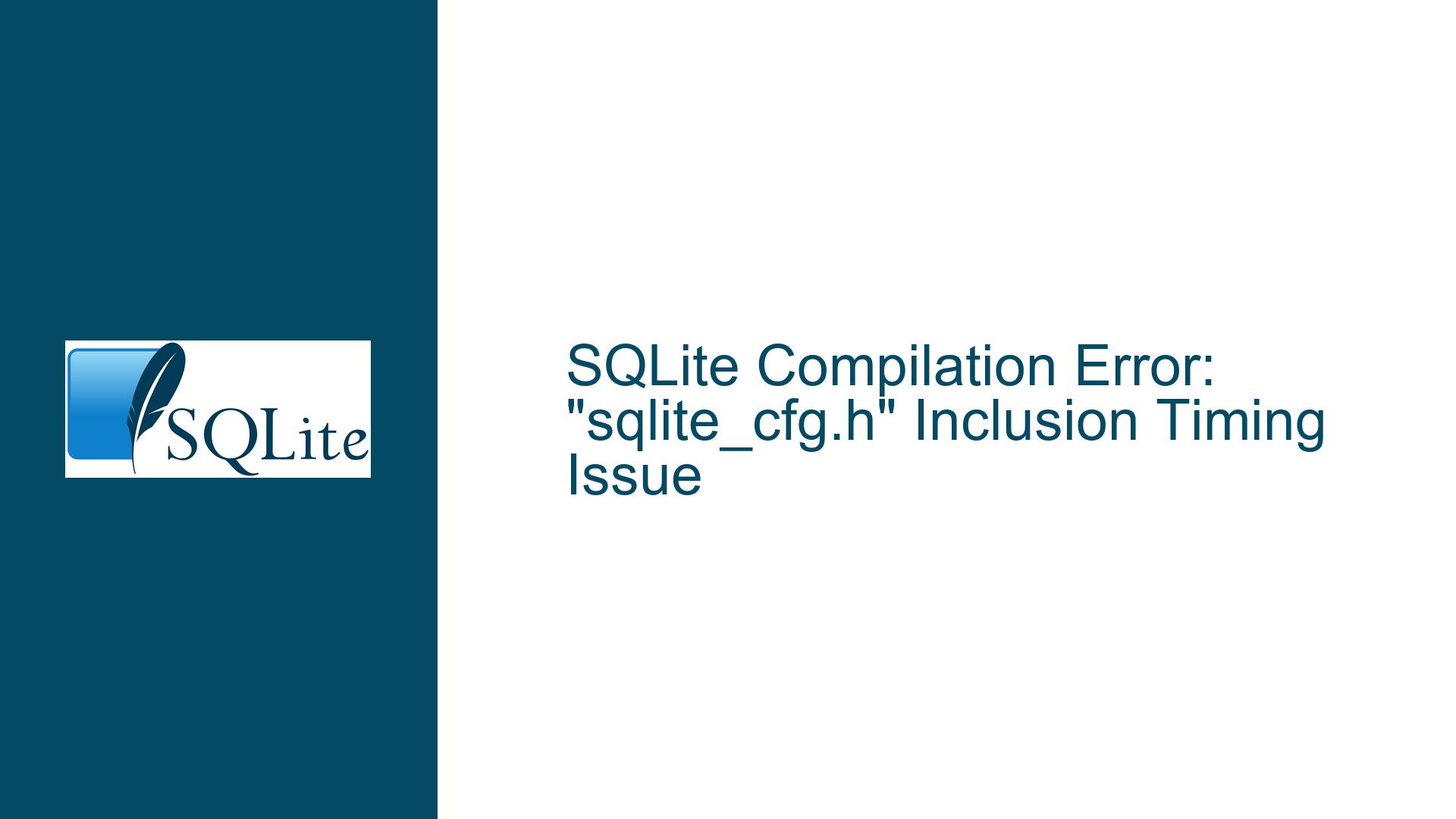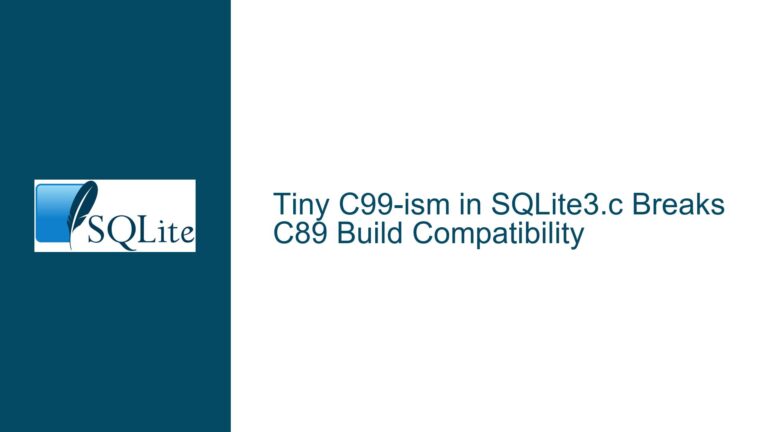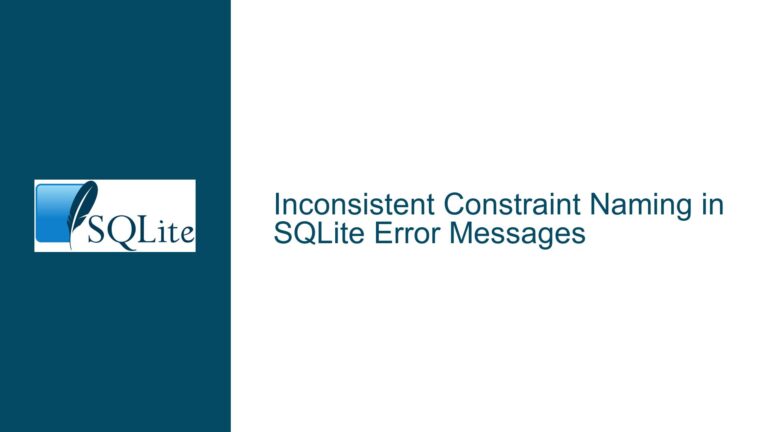SQLite Compilation Error: “sqlite_cfg.h” Inclusion Timing Issue
Issue Overview: Misconfiguration of SQLite Compilation Flags Leading to Syntax Errors
When attempting to compile SQLite from the amalgamation source code using Microsoft Visual C++ (MSVC), users may encounter syntax errors related to the inclusion of the sqlite_cfg.h configuration file. The specific error messages, such as error C2061: syntax error: identifier 'sqlite3_session', indicate that the compiler is unable to recognize certain SQLite features or constructs. This issue arises when the sqlite_cfg.h file, which contains library-level configuration flags like SQLITE_ENABLE_SESSION and SQLITE_ENABLE_PREUPDATE_HOOK, is included too late in the compilation process. The root cause lies in the misuse of the _HAVE_SQLITE_CONFIG_H flag, which is intended for platform-level configuration rather than library-level configuration. This misalignment between the intended use of the flag and its actual application results in the compiler failing to process the configuration directives at the correct stage, leading to the observed errors.
Possible Causes: Misuse of _HAVE_SQLITE_CONFIG_H and Incorrect Flag Application
The primary cause of the compilation error is the incorrect use of the _HAVE_SQLITE_CONFIG_H flag. This flag is designed to handle platform-specific configurations, such as defining operating system dependencies or hardware-related settings. However, in this scenario, it is being used to include a custom configuration file (sqlite_cfg.h) that defines library-level features like session management and pre-update hooks. The _HAVE_SQLITE_CONFIG_H flag is not intended for this purpose, and its misuse disrupts the compilation process. Specifically, the inclusion of sqlite_cfg.h occurs too late, after the compiler has already processed parts of the SQLite source code that depend on the configuration directives defined in the file. This timing mismatch prevents the compiler from recognizing the enabled features, resulting in syntax errors.
Another contributing factor is the lack of clarity in the SQLite documentation regarding the appropriate use of _HAVE_SQLITE_CONFIG_H and SQLITE_CUSTOM_INCLUDE. While the documentation mentions these flags, it does not explicitly distinguish between their intended use cases. This ambiguity can lead users to apply the wrong flag for their specific needs, as seen in this case. The documentation’s focus on platform-level configuration for _HAVE_SQLITE_CONFIG_H is not sufficiently emphasized, causing users to overlook the distinction between platform and library-level configuration.
Troubleshooting Steps, Solutions & Fixes: Correcting Flag Usage and Ensuring Proper Configuration Inclusion
To resolve the compilation error, users must ensure that the sqlite_cfg.h file is included at the correct stage of the compilation process. This can be achieved by using the appropriate flag for library-level configuration, which is SQLITE_CUSTOM_INCLUDE. The SQLITE_CUSTOM_INCLUDE flag is specifically designed to handle custom configuration files that define library-level features, ensuring that the directives are processed at the right time. Here are the steps to correct the issue:
Replace
_HAVE_SQLITE_CONFIG_HwithSQLITE_CUSTOM_INCLUDE: Modify the compilation command to useSQLITE_CUSTOM_INCLUDEinstead of_HAVE_SQLITE_CONFIG_H. The updated command should look like this:cl -DSQLITE_CUSTOM_INCLUDE=sqlite_cfg.h shell.c sqlite3.c -Fesqlite3.exeThis change ensures that the
sqlite_cfg.hfile is included at the appropriate stage, allowing the compiler to recognize the enabled features.Verify the Content of
sqlite_cfg.h: Ensure that thesqlite_cfg.hfile contains the correct configuration directives. For example:#pragma once #define SQLITE_ENABLE_SESSION 1 #define SQLITE_ENABLE_PREUPDATE_HOOK 1These directives enable the session and pre-update hook features in SQLite. Any errors or omissions in this file can also lead to compilation issues.
Check the Compilation Environment: Ensure that the MSVC environment is correctly set up and that all necessary tools and libraries are available. This includes verifying the PATH environment variable and ensuring that the MSVC compiler (
cl.exe) is accessible from the command line.Review the SQLite Documentation: Familiarize yourself with the SQLite compilation documentation to understand the correct usage of flags like
_HAVE_SQLITE_CONFIG_HandSQLITE_CUSTOM_INCLUDE. Pay particular attention to the distinction between platform-level and library-level configuration.Test the Compilation Process: After making the necessary changes, re-run the compilation command to verify that the issue is resolved. If the compilation succeeds, the
sqlite3.exeexecutable should be generated without any errors.
By following these steps, users can avoid the pitfalls associated with incorrect flag usage and ensure that their SQLite compilation process proceeds smoothly. The key takeaway is to use SQLITE_CUSTOM_INCLUDE for library-level configuration and reserve _HAVE_SQLITE_CONFIG_H for platform-level settings. This distinction is crucial for maintaining the integrity of the compilation process and avoiding syntax errors related to feature recognition.
In addition to the immediate fix, users should also consider the broader implications of configuration management in SQLite. Properly organizing and managing configuration files can prevent similar issues in the future. For example, maintaining separate configuration files for platform-level and library-level settings can help clarify their respective roles and ensure that they are applied correctly. Furthermore, documenting the configuration process and sharing best practices within the development team can reduce the likelihood of misconfigurations and streamline the compilation workflow.
In conclusion, the compilation error caused by the late inclusion of sqlite_cfg.h highlights the importance of understanding the intended use of SQLite compilation flags. By using the correct flag (SQLITE_CUSTOM_INCLUDE) and ensuring that configuration directives are processed at the appropriate stage, users can avoid syntax errors and successfully compile SQLite with the desired features. This approach not only resolves the immediate issue but also contributes to a more robust and maintainable compilation process.






